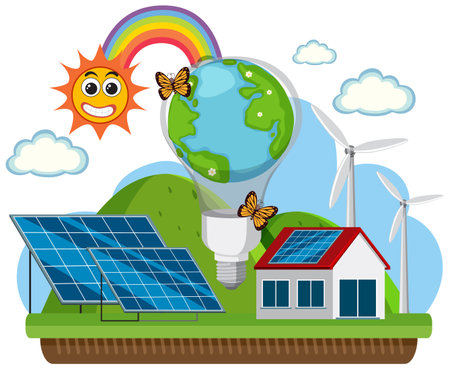Introduction to Solar Power for UK Campers
Imagine waking up to the gentle sounds of birdsong, a fresh cup of tea in hand, and knowing your phone is fully charged—all without ever plugging into the mains. Across the UK, more and more families are embracing solar power as an essential part of their camping adventures. But what’s behind this growing trend? At its heart, solar energy offers campers the freedom to explore wild spaces while treading lightly on the land. With rolling hills, coastal hideaways, and hidden woodland sites right on our doorstep, British campers are keen to enjoy nature responsibly. Solar panels let you harness clean, renewable energy from the sun—even on those famously cloudy days—making it easier than ever to keep your gadgets running, lights glowing, and children entertained. By choosing solar power, you’re not only making life simpler and cosier around the campsite; you’re also helping protect the wild places that make camping so special in the first place. Whether you’re pitching up at a family-friendly site or heading off-grid for a weekend of adventure, solar solutions offer peace of mind and a little extra comfort—all while aligning with a love for the great outdoors.
2. How Solar Power Works on the Road
Setting off on a camping adventure across the UK is an exciting way for families to bond and explore the great outdoors. But how do you keep your devices charged and your campsite cosy, especially when you’re far from a plug socket? Here’s a gentle introduction to solar energy—ideal for beginners and perfect for British weather.
The Basics of Solar Power
Solar power harnesses the energy from sunlight using photovoltaic (PV) panels, converting it into electricity that can be used to charge devices, light up your tent, or even power small appliances. For campers in the UK, portable solar systems are a flexible and eco-friendly solution—no need to rely on noisy generators or hunt down an electric hook-up point.
How Do Portable Solar Systems Work?
Portable solar panels are designed to be lightweight and easy to set up. They absorb sunlight—even through Britain’s famously cloudy skies—and store the generated energy in batteries. Here’s a simple breakdown:
| Component | Function |
|---|---|
| Solar Panel | Catches sunlight and converts it to electricity |
| Charge Controller | Regulates voltage and protects the battery |
| Battery Pack | Stores electricity for use at any time |
| Inverter (optional) | Changes stored DC power to AC for household devices |
Does Solar Power Work in British Weather?
You might wonder if solar panels are effective given the UK’s often overcast climate. Good news: modern panels are efficient enough to generate power even on cloudy days, though they work best with direct sunlight. The key is to angle your panel towards the sun whenever possible and keep them clean from mud or leaves after those classic British showers.
A Family-Friendly Approach
For parents introducing children to sustainable living, setting up a solar system together is a fantastic learning opportunity. Let your little ones help position the panels or check how much power you’ve stored—it’s science in action! Plus, knowing you have reliable energy brings peace of mind, rain or shine.
![]()
3. Choosing the Right Solar Setup for Your Camping Trip
Finding the perfect solar setup for your family’s camping adventures in the UK can feel a bit daunting, but with a little know-how, you’ll be harnessing the power of the sun in no time! The unpredictable British weather and unique campsite conditions mean you’ll want to select equipment that is both practical and reliable.
Consider Your Power Needs
Before choosing any kit, sit down as a family and make a list of your essential gadgets—think lights, phones, tablets, or even that must-have cup of tea from your electric kettle. Add up their total wattage and think about how long you’ll need to run each item per day. This will give you a rough idea of the panel size and battery capacity you’ll need.
Solar Panels: Go Portable or Fixed?
For most UK campsites, portable solar panels are ideal—they’re lightweight, easy to pack, and can be moved to catch every ray of sunshine (when it peeks through!). Look for panels with robust waterproofing and sturdy stands to handle those sudden British showers. Monocrystalline panels tend to offer higher efficiency on cloudier days, which is perfect for our famously unpredictable skies.
Batteries: Keeping the Lights On
When it comes to batteries, lithium options are lighter and last longer than traditional lead-acid types—ideal if you’re travelling with children and want to keep things simple. Make sure your battery has enough capacity for at least one full day’s use; after all, nobody wants grumpy little campers if the fairy lights go out early!
Accessories: Don’t Forget the Extras
Invest in good-quality charge controllers to protect your batteries from overcharging (especially important when leaving equipment unattended while exploring). Extension leads, sturdy connectors, and waterproof cases will help your kit stand up to the rigours of UK family camping life. And don’t forget adapters suitable for common campsite hook-ups—after all, every family’s needs are unique!
Top Tip:
Always check campsite regulations before heading off—some sites have restrictions on panel placement or battery charging, so a quick call ahead can save hassle and keep everyone happy.
4. Installation and Safety for Families
Setting up a solar power system while camping in the UK can be a rewarding family activity, especially when everyone gets involved. With a few simple steps and some helpful tips, you’ll have your solar panels up and running in no time—keeping your gadgets charged and your little ones safe throughout the adventure.
Safe and Simple Steps for Solar Installation
Solar power installation doesn’t need to be complicated. Here’s a step-by-step guide that’s perfect for families:
| Step | What To Do | Family-Friendly Tip |
|---|---|---|
| 1. Choose Your Spot | Select a sunny, flat area free from shade. | Let children help scout the “sunniest” spot using a compass or their shadow! |
| 2. Position the Panels | Lay out the panels facing south for maximum sunlight. | Ask kids to help angle the panels and explain how sunlight powers your devices. |
| 3. Connect Safely | Attach the cables to your charge controller, then to your battery. | Keep little hands away from wires; let them watch as you connect everything securely. |
| 4. Secure Everything | Check all connections are tight and weatherproof. | Challenge children to spot any loose wires or trip hazards – make it a safety game! |
| 5. Test the System | Switch on and check if your devices are charging. | Let children see the results of their teamwork as phones or torches light up. |
Safety Tips Around Solar Gear
- Cable Management: Use cable ties or covers to keep leads tidy and avoid trips – especially important when excited feet are running about!
- No Wet Hands: Remind everyone, big or small, never to touch electrical components with damp hands (after washing up or a rainy walk).
- Panel Protection: Teach children not to climb on or lean objects against the panels – they’re tough but not indestructible!
- Packing Away: When you’re moving camp, involve the whole family in disconnecting and storing gear safely – it builds good habits for future adventures.
- Campsite Courtesy: Set up solar panels so they’re not blocking walkways or shared spaces, keeping things pleasant for neighbouring campers.
A Little Reassurance for Parents
The beauty of portable solar kits is that they’re designed with safety in mind. By following these steps, you’ll empower even your youngest explorers with knowledge about renewable energy—while giving yourself peace of mind knowing everyone’s protected. Whether you’re charging lanterns for a bedtime story under canvas or topping up your mobile for that emergency call, taking care with installation means more fun and less worry for every member of the family.
5. Making the Most of Solar Power on UK Campsites
When you’re camping across the UK’s picturesque countryside, making the most of your solar power setup can truly transform your holiday experience. Here are some family-friendly tips and reassuring advice to help you get the best out of your solar panels – keeping everyone’s gadgets charged and camp nights beautifully lit.
Smart Storage: Keep Your Energy for When It Matters Most
British weather is famously unpredictable, so storing the energy you generate is key. Invest in a reliable portable power station or a set of high-quality rechargeable batteries. These will allow you to bank the sunshine from those precious sunny spells, ensuring you have power for torches, lanterns, and even your morning cuppa, come rain or shine.
Use Energy-Efficient Devices
Choosing low-energy devices can make a world of difference. Opt for LED lights, which use far less power than traditional bulbs. For phones and tablets, look for energy-saving modes or switch them off when not in use—perfect for encouraging kids to enjoy nature while still having a safety net for emergencies.
Clever Placement of Panels
To maximise sunlight absorption, position your solar panels where they’ll get the most sun throughout the day—think south-facing and away from shade cast by trees or tents. If possible, adjust their angle as the sun moves (and don’t forget to clean off any dew or dust each morning for peak performance).
Charge During Peak Sunlight Hours
Make it a fun family routine to charge up during midday when the sun is at its highest—even on cloudy British days, there’s often enough UV light to generate usable power. Remind everyone to plug in those essentials after breakfast, so by evening, you’ll have plenty of juice for storytime lighting or a last check-in with loved ones back home.
Prioritise What Matters Most
Decide together which devices are essential—a great chance to teach children about energy conservation! Maybe it’s keeping a lantern glowing all night for little campers who aren’t quite ready for pitch darkness, or making sure someone’s phone stays powered up for photos and directions. By working as a team, you’ll not only stretch your solar supply but create lasting memories under the stars.
6. Frequently Asked Questions and Troubleshooting
Your Most Common Solar Power Questions – Answered!
When it comes to using solar power on camping trips across the UK, many families have similar questions and a few worries. Don’t worry – you’re not alone! Here we’ll address some of the most frequently asked questions, offering down-to-earth advice to ensure your family adventures go off without a hitch.
What if there’s not enough sun?
British weather can be unpredictable, but modern solar panels are designed to work even on cloudy days. While you might not get maximum power, your panels will still generate some electricity. To stay on the safe side, consider bringing a backup battery or charging devices during sunnier spells.
How do I know if my solar setup is working?
Most portable solar kits include indicators or simple displays to show when they’re charging. Check these regularly, and get into the habit of monitoring your battery levels. If you notice a drop in performance, check for dirt or obstructions on your panels.
Can I run all my camping gadgets on solar power?
It depends on your panel’s wattage and your gadget’s energy needs. Things like phones, lanterns, and small coolers are usually fine. For high-energy appliances like kettles or hairdryers, it’s best to stick with campsite facilities to avoid draining your batteries too quickly.
What should I do if nothing seems to work?
If your system isn’t powering up as expected, start by checking all connections are secure and clean. Make sure the panel is angled towards the sun and not shaded by trees or tents. Still stuck? Refer to your user manual for specific troubleshooting steps or ask your local camping store for advice.
Is it safe for kids?
Absolutely! Solar panels don’t have moving parts and produce no open flames or fumes. Just remind little ones not to play with cables or connectors, and always supervise them near electrical equipment.
A Final Reassurance
Solar power is a brilliant way to make UK camping trips more sustainable and self-sufficient. With a little preparation and some simple checks along the way, you can rest easy knowing your family’s devices will stay powered up—come rain or shine.


